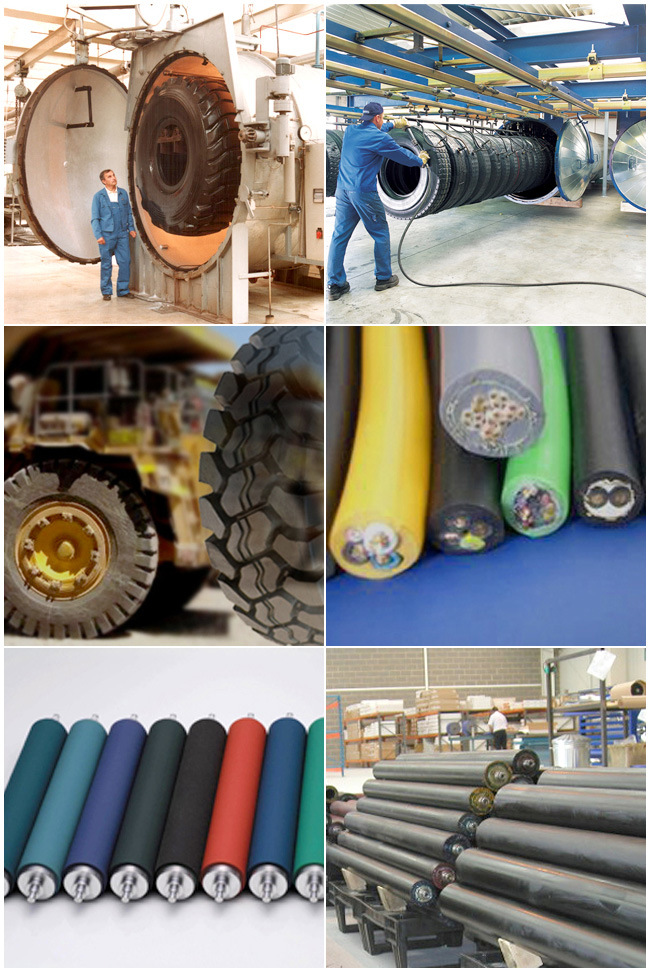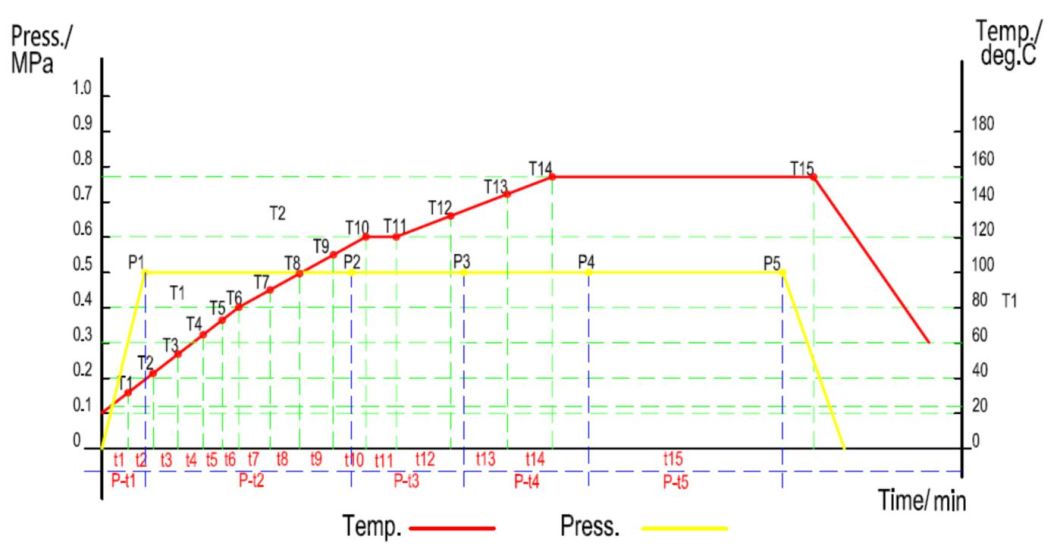Model NO.: SN-LHGR1530
Design Temperature: 180 ºC
Max. Working Temperature: 160 ºC
Heating Mode: Electric/Steam/Thermal Oil
Control Mode: PLC+PC
Control Software: Tpc (Thermal Processing Control)
Voltage: 380/400/415/440/480/600VAC
Insulation Material: Ceramic Fiber
Weight: 3260 Kg
Trademark: SINOMAC or OEM
Transport Package: Standard Seaworthy Package
Specification: 1500X3000mm
Origin: Changzhou, China
HS Code: 84778000
1. Applications of SINOMAC Vulcanization AutoclaveRubber vulcanization is a chemical process at a given pressure, temperature and time for converting natural rubber into more durable materials by the addition of sulfur. These additives modify the polymer by forming cross-links (bridges) between individual polymer chains. Vulcanized materials are less sticky and have superior mechanical properties. And vulcanization autoclave is used widely for this chemical process. The main products are galoshes, rubber tubes, cable, rubber roller, rubber ball, etc.

2.  SINOMAC Leading Position in the Industry
In order to get high-quality rubber rolls, it is very necessary to directly vulcanize the rubber rolls with metal supports inside. This modified treatment is processed in SINOMAC rubber vulcanization autoclave. Inside the autoclave, the pressure, temperature and time can be controlled effectively without the help of molds. In this field, SINOMAC has been the leader, as we have accumulated full vulcanization experience and technology for many years.
3. General Feature and Working Process
3.1. General Feature
Autoclaves with direct steam: heating and pressurization are carried out with steam. This heating system is particularly effective and indicated for products of large sizes and weight. The temperature uniformity which normally varies between ±2°C, the exchange capacity, occurring with condensation on colder surfaces, coupled with tested installations, allow to obtain excellent results.
3.2 Working Process
3.2.1 Standard curing recipe
| Â | Temp. setpoint | Press. setpoint | Temp. step duration | Press. step duration |
| Segment1 | T1 | P1 | t 1 | P-t1 |
| Segment2 | T2 | P2 | t 2 | P-t2 |
| Segment3 | T3 | P3 | t 3 | P-t3 |
| Segment4 | T4 | P4 | t 4 | P-t4 |
| Segment5 | T5 | P5 | t 5 | P-t5 |
| Segment6 | T6 | Â | t 6 | Â |
| Segment7 | T7 | Â | t 7 | Â |
| Segment8 | T8 | Â | t 8 | Â |
| Segment9 | T9 | Â | t 9 | Â |
| Segment10 | T10 | Â | t 10 | Â |
| Segment11 | T11 | Â | t 11 | Â |
| Segment12 | T12 | Â | t 12 | Â |
| Segment13 | T13 | Â | t 13 | Â |
| Segment14 | T14 | Â | t 14 | Â |
| Segment15 | T15 | Â | t 15 | Â |
3.2.2 A short curing recipe example

4. Equipment Technical Details
4.1 Pressure Vessel
SINOMAC Pressure Vessel with quick-opening door, can be certified to:
- CHINESE STANDARD, GB150-2011
- AMERICAN STANDARD ASME SEC VIII DIV.1 with ASME Certificate
- EUROPEAN STANDARD PED 97/23/EC with CE certificate.
- The closing system of the autoclave is the indented kind assisted with a hydraulic system, in order to quickly and secured make a totally hermetic closing.
- The whole system consists of three parts: a pair of gear flange, driven devices and seal ring.
- Hydraulically operated door opening and closing. It is controlled by PLC system.
- The seal ring is made of silicon rubber.
- Safety pressure sensors have to prevent door opening in case of pressure (allowed less than 0.1 bars).
Internal Insulation and External Insulation
We use ceramic fiber as the insulation material. The heat transfer coefficient is very low to make the heat loss to a minimum. The covering board of ceramic fiber is stainless steel. It is corrosion resistant and looks nice. Internal insulation design can get a low energy consumption, while external insulation design gets a high one, but a better temperature uniformity.
- Insulation:Internal insulation layer
- Insulation material:Ceramic fiberÂ
- External sheet metal: stainless steel,1.0 mm
- Insulation thickness:100mm
- The heating system is a indirect steam kind.
- The indirect system will be through stainless-steel or copper tubing type heat exchanger placed on the rear side of the autoclave between fan and products. The flow have to move from material to fan, then move front door using vessel side to material
- Heating Exchanger material :304 Stainless-steel with aluminum fin or copper tubing aluminum fin
- Heating Exchanger type: Multi-row finned tubing
- Hot air circulating duct
Annular air-duct placed on the two side of the autoclave inside as the forward air delivery system. This design features make the temperature more uniform, and working space more big.  - The Motor fan for circulation
The motor is bolted to the rear of the autoclave, it drives the fan directly. -
Shaft sealing
Working with water cooling to guarantee a long life, the shaft water cooling with separate water pump and flow switch to be fitted to monitor water flow and automatically alarm/stop the cycle if there is not enough water flow.
Temperature thermocouples: 2 pcs, K type, including HMI monitoring, data-acquisition and control.
4.7Â Pressure Components
- Inlet and exhaust valve, proportionally controlled, Electric control valve.
- Manual exhaust valve, 3-piece ball valve.
- Solar Panel
New Energy Power Supply
Ningbo Tuofeng Outdoor Products Co., Ltd. , https://www.tuofengoutdoor.com